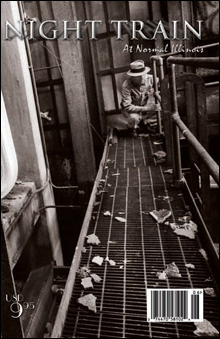|

UPSTART: Night Train moves towards the sensational
|
For the record, some of us still read the New York Times Magazine the old fashioned way, with the ink coming off on our fingers. Even when the subject is the end of paper publishing and in its place the coming of something called the
universal library
: a digitized collection of every book ever written. It’s an idea that’s as appealing to Web geeks as it is to bibliophiles: imagine a world in which all texts are networked, tagged, linked, annotated, and cross-referenced. In an omniverse where all books coexist as one living hyperconnected Document, the next great lit leap could be a grand Conversation: all texts in dialogue with each other, like an iLib on shuffle. For those who thought The Gray Album was neat, the literary remix could be revolutionary: imagine The Metamorphosis remixed with Murakami’s Kafka on the Shore and Plato’s Symposium.
If the future, as the Times insists, is global, viral, digital, and omnipresent, do traditional literary journals have a place in it? In Boston, the answer is probably yes. Two of our oldest and most venerable lit mags offer selected content online -- and what’s more, a newer voice has joined the game. Since it’s spring, they’ve all got new issues out. Below, your guide.
Agni
In the
Editor’s Note
, Sven Birkerts worries about more than just audiobooks and iPaper. He frets about writers “hearing not the prompt of the creative Muse, but a voiceover track.” He poses that the world we live in now “no longer assumes automatic correspondence between word and correlative object or action,” and that writers can no longer fall back on “using the old world as a prop.” Tough stuff, but not without hope.
The selections do, for the most part, live up to Birkerts’s challenge, and there’s a sense of gravitas to the collection as a result.
Phong Nguyen’s “
Memory Sickness
,
” is told in a series of brief, potent scenes involving a Vietnamese kid adjusting to life in America post Vietnam trauma. Seven short essays by Charles Bardes give subtext to certain medical practices -- urinalysis, radical mastectomy, morphine -- with a mix of history, politics, and humanity. Best of the whole batch is Ben Miller’s essay “
A Study in Sequins
” about a girl on the talent circuit. Told in rapid, vivid prose, it transcends the reality TV-ness of the topic and ends up heartbreaking.
Night Train
A young upstart compared to established stalwarts Agni and Ploughshares, Night Train tends towards sensational stories, sometimes shocking, often violent, and its spring issue holds much of the same. Local author Jon Papernick’s “
My Darling Sweetheart Baby
” begins with the butterfly flush of new love and ends with violation. Laura Payne Butler’s “
Ruby Red
” also closes in violence after a couple botches a diner robbery. And in “
What Kind of Person Gives Secrets to the Sky
?,” Kathy Fish, in a blast of short paragraphs, draws a sad and desperate family.
Ploughshares
The poems in this issue stand out above the stories. Particularly Bruce Smith’s “Through the Agency of Al Green” and Dean Young’s “Coming From, Going To.” (Ploughshares offers content online, but links change daily.) Local poet Kevin Young is the guest editor, and in his
introductory note
he mourns the closing of the Plough and Stars (where the mag was founded) and the death of old Cambridge, with a hopeful note at the end when he finds out the Plough would make a comeback: “maybe not everything has to disappear after all.”